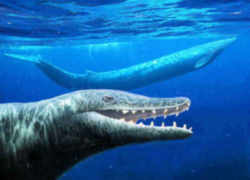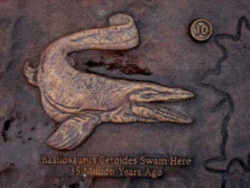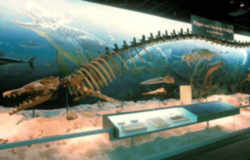Alabama Symbols
Alabama State Fossil
Zeuglodon (Whale)

(Basilosaurus Cetoides)
Adopted in 1984.
The Zeuglodon, Basilosaurus Cetoides, was adopted in 1984 as Alabama state fossil. In 1834 a complete skeleton of a basilosaur (king of the lizards) was found on a plantation in southwestern Alabama. Staff of the Philadelphia Academy of Natural Sciences studied the skeleton and said it was not a lizard, but a meat-eating member of the whale family. Because of this they renamed it the zeuglodon (Genus Basilosaurus). Since it was a sea animal they estimated it to be over forty-five million years old (Eocene period). Zeuglodons averaged from fifty-five to seventy feet long and had tails up to forty feet long.
Alabama State Fossil: Zeuglodon (Whale)

Basilosaurus had a wedged-shaped head up to 5 feet long with jaws containing two types of teeth. The teeth in the front, anterior, of the jaw had cone-shaped teeth which caught and held its prey while triangular-shaped teeth in the rear, posterior, of the jaw sliced them up. The type and amount of wear on the teeth of the Basilosaurus indicates that it likely ate fish and squid (Johnston 1991 Carpenter and White 1986).
The bones of Basilosaurus cetoides (Owen) and other primitive whales have been found throughout a belt across Louisiana, Mississippi, and Alabama where exposures of Middle and Upper Eocene marine strata, called the Moodys Branch Formation (or Marl) and the Yazoo Clay occur. The vertebrates were so common within some areas of this belt that local residents used them as andirons for fireplaces and blocks to support cabins. The bones and skeletons of Basilosaurus also have been found in Australia, Egypt, within other marine sediments of Upper Eocene age (Domning 1969, Johnston 1991, Thurmond 1981).

Fossil remains of this gigantic
whale were first found in Clarke County about 1833; bones were later discovered in Choctaw and Washington Counties.
Fossil remains of the Basilosaurus cetoides may not be removed from the state without prior written approval of the governor.
The ancient whale fossil is most abundant in Alabama and many zeuglodon skeletons have been found here. One was found in 1982 near Washington County
and is now displayed at the McWane Center in Birmingham. Another was found in Alabama and sent to the Smithsonian Institution in Washington, DC. These
are the two most comprehensive Basilosaurus cetoides skeletons ever found.
Alabama Act No. 84-66
In 1984 the legislature made the zeuglodon whale the state fossil by Act no. 84-66. A portion of the legislation is shown below:
WHEREAS, The Alabama Legislature notes that the ancient whale, Species Basilosaurus Cetoides, named after the forty million year
old whale fossil was discovered in Washington County, Alabama; and
WHEREAS, This ancient whale fossil is most abundant in the State of Alabama, and two of the most comprehensive skeletons of the Species Basilosaurus
Cetoides were discovered in Alabama, one discovered by Mr. Ronald "Bones" Rhoades and now located in the Red Mountain Museum, Birmingham,
Alabama, and the second, a fifty-five foot skeletal exhibit, is on display in the Smithsonian Institute, Washington, D.C.; and
WHEREAS, The Alabama Legislature feels it is most appropriate that the interest in and study of this ancient aquatic mammal predator, with serrated
posterior molars, be encouraged, and perpetuated for scientific and historical reasons; now therefore,
BE IT RESOLVED BY THE ALABAMA LEGISLATURE BOTH THEREOF CONCURRING that the Alabama Legislature does hereby designate as the official State of Alabama
Fossil, the "Species Basilosaurus Cetoides."
RESOLVED FURTHER, That no fossil "Species Basilosaurus Cetoides" shall be removed from the State of Alabama in whole, or part, except by
prior written permission of the Governor.
Alabama Law
The law designating the Zeuglodon (whale) as the official Alabama state fossil is found in the Unannotated Code of Alabama 1975, Title 1, Chapter 2, Section 1-2-20
Title 1 GENERAL PROVISIONS
Chapter 2 STATE SYMBOLS AND HONORS.
Section 1-2-20
Section 1-2-20
State fossil.
The Alabama Legislature does hereby designate as the official State of Alabama fossil the "Species Basilosaurus Cetoides."
No fossil "Species Basilosaurus Cetoides" shall be removed from the State of Alabama, in whole or in part, except by prior written approval
of the Governor.
(Acts 1984, No. 84-66, p. 89.)
Taxonomic Hierarchy: Zeuglodon (Whale)
Kingdom: Animalia (animals)
Phylum: Chordata (having a spinal cord)
Subphylum: Vertebrata - vertebrates
Class: Mammalia (mammals)
Order: Cetacea (aquatic mammals)
Suborder: Archaeoceti (archaeocetes or zeuglodonts, extinct, primitive whales with teeth)
Family: Basilosauridae (late Eocene) - larger, more whale-like cetaceans
Genus: Basilosaurus
Species: Basilosaurus Cetoides

Some states that lack a "state fossil" have nevertheless singled out a fossil for formal designation such as a state dinosaur, rock, gem or stone.







